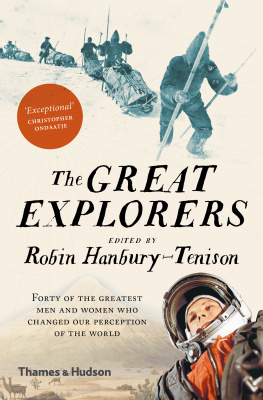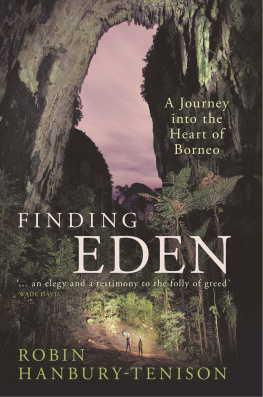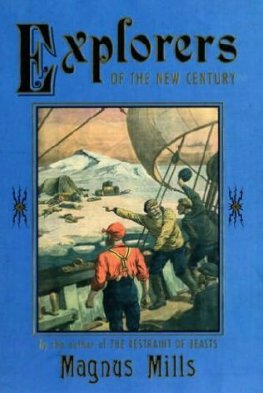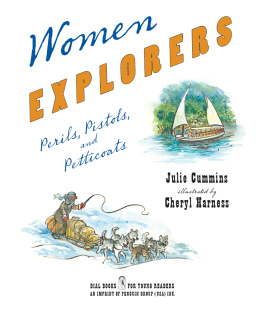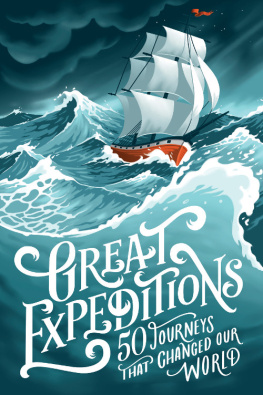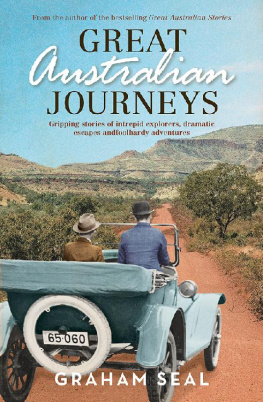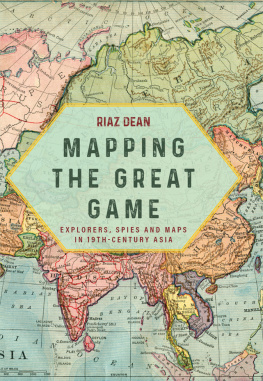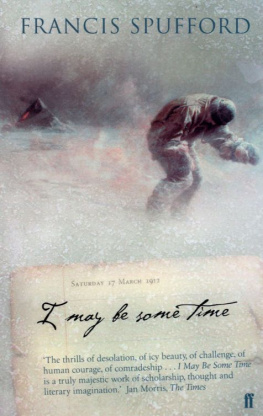


About the Author
Robin Hanbury-Tenison is a well-known explorer, author, film-maker, conservationist and campaigner. A veteran of over thirty expeditions, he is a leading member of the Royal Geographical Society and Survival International. His books include The Seventy Great Journeys in History and, as editor, The Oxford Book of Exploration.
Other titles of interest published by
Thames & Hudson include:
Explorers Sketchbooks
The Modern Explorers
Naturalists in Paradise
www.thamesandhudson.com
www.thamesandhudsonusa.com
CONTENTS
| David Boyle
| Ronald Watkins
| Paul Rose
| Vanessa Collingridge
| Vanessa Collingridge
| David Ewing Duncan
| Carolyn Gilman
| John McAleer
| Robert Twigger
| Jules Stewart
| John Ure
| Bill Colegrave
| Robin Hanbury-Tenison
| Susan Whitfield
| Conrad Heidenreich
| Miles Bredin
| Robert Twigger
| Anthony Sattin
| Alexander Maitland
| Clare Pettit
| John Keay
| James L. Newman
| Russell Potter
| Isobel Williams
| Russell Potter
| Russell Potter
| Justin Marozzi
| John Ross
| Justin Marozzi
| John Ure
| Andrew Goudie
| Alexander Maitland
| Paul Rose
| Milbry Poke
| Peter Raby
| Oliver Tooley
| Jeremy Scott
| Francis French
| Jean-Michel Cousteau
| Andrew James Eavis
When you set out on your journey to Ithaca, pray that the road is long, full of adventure, full of knowledge.
C. P. CAVAFY, 1911
G reat explorers are different from other men and women. Throughout the ages, certain people have excelled in their geographical endeavours to an extent that has changed the world. These are the people who, through their explorations, transformed our perception of our surroundings they revealed the planet to us and opened our eyes to the physical, natural and historical world around us. It started long ago and it continues today. It has always been mankinds gift, and curse, to be inquisitive this is what makes us unlike all other species. Without this curiosity we would all have stayed at home. Since we developed the brains we have today, perhaps at least 100,000 years ago, we have viewed life differently from other creatures. We have looked beyond our immediate surroundings, to the possibilities that each new territory has to offer, and we have felt an urge to go further and explore, not just for food, space and land, but also out of curiosity.
Never has it been more important to recognize where our curiosity has led us, what it has brought us in knowledge and understanding, and what it can tell us about our responsibility to this planet. Once, it was a new and unknown world. Now, while most of the wonder and diversity are still there, we are just beginning to realize, at the last dangerous moment, that there is still so much we do not understand and so little time to get it right. The urgency to explore has never been greater.
Ever since we emerged from the Rift Valley in Africa, where it is now generally accepted that Homo sapiens originated, we have explored. The earliest pioneers, who rapidly spread out to occupy most of the habitable and accessible land, were the original great explorers. No one can ever again replicate the experience they had of setting foot for the first time on swathes of diverse, pristine landscape, from deserts to tropical rainforests, from mountains to fertile plains. There have, however, been many since who have been driven to explore the limits of the worlds known to them and to their societies. A few, whose curiosity and courage led them to reveal what lay beyond the horizon, stand out from the crowd as giants. These were the Great Explorers and, from the many who qualify for inclusion, this book describes 40 of the most interesting. These were the men and women whose biographies reveal not just their dogged ambition, which drove them to go the extra distance, but also their other strengths and weaknesses, their greed, courage, authority and individuality, and, above all, their spirit of inquiry. Often it was an obstinate belief in themselves and their dreams that made them succeed where others failed.
CROSSING OCEANS
The great era of recorded exploration began as this book begins with the oceanic journeys of around five hundred years ago. When Columbus reached the New World, his journey was arguably the most cataclysmic in human history. No other geographical discovery unleashed so much change on so many, nor had such a lasting effect. The known world was effectively doubled in size at a stroke. Soon after Columbus sailed west, Vasco da Gama, one of the few explorers to die successful and rich, opened the route to the east. Spices, such as pepper and cloves, were until then obtained only through the expensive and rare cargoes which survived interminable overland journeys. Suddenly, Europe found itself sitting between two vast sources of wealth. From then on, for the next few centuries, the majority of exploration was focused on finding better ways and faster routes to capitalize on these riches.
Magellan, another ruthless and determined man, demonstrated in his search for a western route to the Spice Islands that the world could be circumnavigated, though he himself did not survive the journey. Thereafter, gradually, the oceans were conquered until virtually no habitable place within them remained unrevealed. At first Spain and Portugal concentrated on looting and destroying the incomparable empires of the Americas and jostling for possession of the Spice Islands. Then other important naval world powers, Britain and France, began to push the boundaries further to the east, discovering new islands and founding colonies. Their finest captains, such as Bougainville and Cook perhaps the greatest navigator of all time were enlightened men, who sought knowledge rather than riches, and in that sense were very different from the conquistadors; but the changes they brought to cultures unprepared for western diseases and attitudes were almost as devastating.
EXPLORING CONTINENTS, BY LAND AND RIVER
On land the challenge was to penetrate to the deepest parts of the interiors of the unknown continents. In the New World, there was the enticing prospect of mythical cities of gold, which drove conquistadors such as Hernan Corts, Francisco Pizarro and Hernando de Soto to commit many excesses. Later, there was the prospect of new land to settle, which led President Jefferson to send Lewis and Clark to the west of North America. Unusually, these two men managed joint leadership of a major expedition without acrimony, but their success was to be followed by the massive American migration which displaced the Plains Indians.
Africa, of course, drew many explorers to uncover its wonders and secrets. Before the days of photography, skilful painters such as the modest Thomas Baines, who travelled for a time with Livingstone, recorded scenes that amazed and informed the Londoners and Parisians who bought them. Complex characters including the mystic Richard Burton, who travelled in Arabia as well as Africa, became the celebrities of their day, lionized and listened to. In Asia, the Great Game (the struggle for supremacy between the Russian and British empires) was an excuse and a cover for many explorations of epic length. The Russians had the redoubtable hunter Nikolai Przhevalsky, after whom the wild horse is named; the British had soldiers and dreamers such as Francis Younghusband and dogged, reserved men such as Ney Elias and Nain Singh and other Pundits. They vied with each other to influence the course of history, while mapping vast unexplored areas. Once again, among them were those whose spur was their insatiable curiosity to measure or to understand such as the determined and dogged Aurel Stein. Reading about these extraordinary men we learn what it is that drives a rare few to push the limits of travel beyond the bounds of possibility.
Next page
